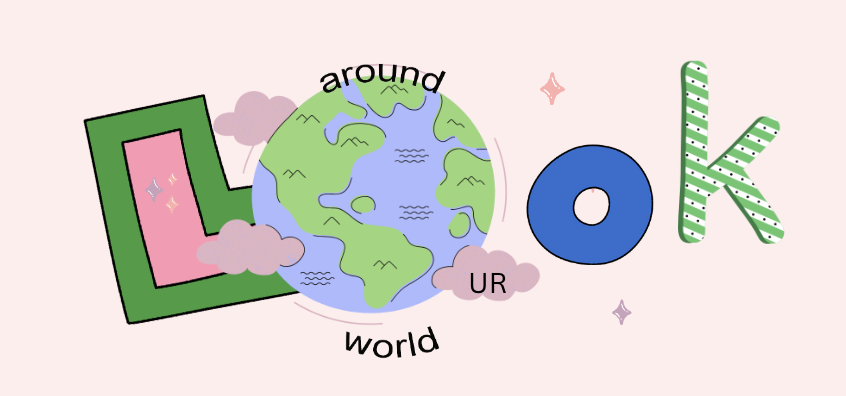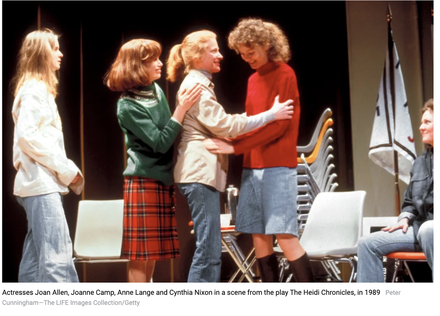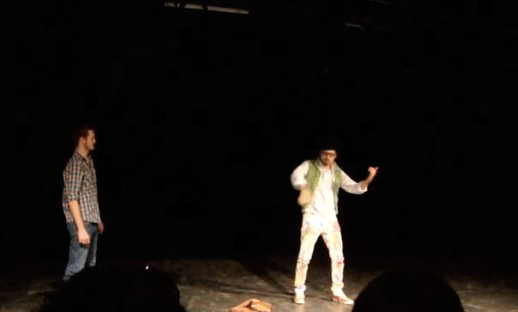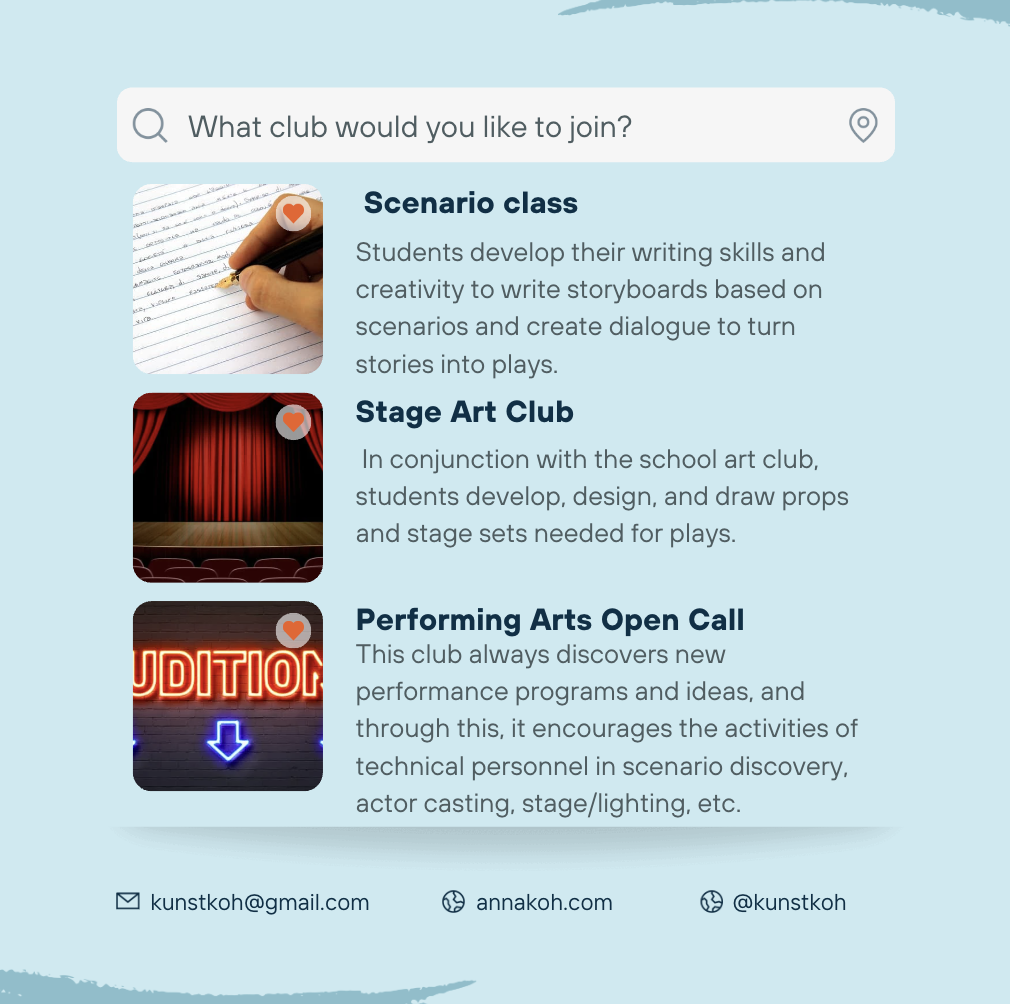Proposal for educational theatre.* This post is a proposal created as part of the Theater Residency Proposal class. We will look at theatre residencies that can be implemented into your theatre classroom to add to the theatre arts curriculum and connect to state standards. We will also explore how to devise an original theatre arts residency. from Educational theatre Module 11, Adelphi University. PROPOSAL: “Look around our World” theater company partners with local artists and public schools (Three village school district) through educational theatre, guiding students to gain understanding and inspiration about the world around them and to develop authentic identities through individual and community exploration. About Our mission is to help students realize their true selves through educational theater, to awaken to self-awareness, and to have a lens through which they can properly view the world. It is a performance-based company that helps students courageously and joyfully explore the world around them, including themselves, by using storytelling and various theater techniques to maximize the effectiveness of educational theater. The main program consists of detailed programs through the participation of local artists in the relevant field, with the categories of school performances, school residency, and after-school enrichment programs. When students join community experts and artists to explore the society that surrounds them, they can look at the world more freely and critically, breaking away from the standardized and stereotyped public education curriculum. Programs offered: School Time performances, educational theater residencies, Community artist talks, After-school enrichment programs. School time performances Where: All junior high school in public school district. When: April 2024- June 2024 Sept 2024-June 2025 Description: Look around our World has two rotating performances in its repertoire. Through plays that focus on the concerns that teenagers face, such as school violence and peer relationships, we encourage them to reflect on themselves and become considerate and caring for others. In addition, we instill in students a sense of community living together through plays on various social and environmental issues. Performance 1: The Heidi Chronicles by Wendy Wasserstein (2 Acts) The scenes cover notable events in Heidi's life from the age of 16 to 40. This includes her romantic relationships, participation in women's groups, friends, education, and her career as an art historian. Performance 2: Trying to Find Chinatown by David Henry Hwang (Act 1) Trying to Find Chinatown by David Henry Hwang, Ronnie, a Chinese American, plays his violin on the streets of New York's Lower East Side. His clothes are from the 60s and he also has piercings. Benjamin, a blonde tourist from the Midwest, pauses and listens. Benjamin asks directions to a Chinatown address, and Ronnie is confused. They debate ethnic identity. Educational Theater Residency In collaboration with local artists and experts, we conduct a six-week educational theater residency program in the form of a monodrama to help students discover their identity, view the world through an artist's lens, and express themselves. Details of the program are as follows. 1. Awake yourself (Finding your identity): In the world, people from various backgrounds and environments live in cooperation with each other. We will read graphic novels that cover these topics together and then create and perform a play based on the content. Students discuss diversity with each other and then research related topics. At this time, a storytelling expert joins the students to search for materials and create a story using the discovered keywords. The created story will be adapted into scenario together with the theater teacher. These scenarios are developed as classroom performances. Program example) Graphic novel Wake (by Rebecca Hall) Wake, a graphic novel and memoir, is an imaginative masterpiece that tells the story of a female-led slave rebellion and chronicler Rebecca Hall's efforts to uncover the truth about hitherto marginalized female warriors. Through reflection on the main messages of this book: black people's human rights, women's human rights, and slavery, you will be able to have a correct and critical historical consciousness. After reading this book, you will discover keywords to turn into a play and create your own scenario. The expert teaches knowledge of storyboard writing, character development, dialogue creation, performance, and stage/sound/lighting equipment. This will guide you in practicing historical-themed playwriting. The class is held in conjunction with a history class. 2. Seeing the world through the lens of artists: What does the world look like as artists see it? When you look at their work, it looks like they have a special lens. Through the lens of art, it serves as a medium through which you can see yourself, your life, the world, and draw a map of your life, guiding you to find the essential things yourself. To this end, we invite local artists to view their works and hear stories about their lives. Students look at their biographies and works and tell stories based on the stories in the works. Have them create a short play based on this scenario. 3. Monodrama for self-expression: This is a program to think, express, feel, and learn while laughing and having fun, from basic warm-ups to self-expression through play and improvisation, and presentations tailored to each individual's characteristics. It starts with basic physical training and focuses on self-expression through improvisation. Like a self-introduction, we create a monodrama or play tailored to each individual's characteristics, film it with a camera, and monitor it together. Educational Theater Residency Curriculum Overview Week 1: Research graphic novels, novels, and works of art that fit your topic. Identify the storyline in each work and extract key characters. Extract keywords from novels or works. Week 2: Students collaborate with local experts and artists to create short scenes based on extracted keywords, characters, and storylines. Screenwriters collaborate and assist students when creating dialogue. Week 3: Once the dialogue creation is complete, create dialogue based on the dialogue by reinterpreting the work in creative ways, such as modernizing it, making it into art, or changing it paradoxically. At this time, students divide into small groups to discuss and define the direction and characteristics of their work. At this time, casting is done according to each role. Week 4: We practice for a play using the prepared script. Roles are divided into an actor team for plays such as vocalization, tone, gesture, and motion, and a technical team for equipment/lighting/sound, etc. Week 5: Each team will have a final rehearsal. At this time, a theater major is invited to watch the students' rehearsals. Experts communicate their evaluations to students in teams. During the rehearsal, we film with a camera and monitor together. Week 6: On the final presentation day, a performance will be performed using the school's auditorium. Community performing arts artist talk with performance This event is a program that invites local performing arts artists to watch a short performance and then listen to a lecture. During lectures, students are invited on stage and perform together. This is a program created by lecturers and students who encourage students to respond through quizzes and learn about the field through this. After-school enrichment program (free) - Scenario class for writing play scenarios and storyboards: Students develop their writing skills and creativity so that they can write storyboards based on scenarios and create dialogue to turn stories into plays. - Stage set painting class with art club: In conjunction with the school art club, students develop, design, and draw props and stage sets needed for plays. - Performing Arts Program Open Call: This is a club that always discovers new performance programs and ideas, and through this, it encourages the activities of technical personnel in scenario discovery, actor casting, stage/lighting, etc.
0 Comments
Leave a Reply. |
Myungja Anna KohArtist Categories
All
Archives
July 2024
|
Proudly powered by Weebly





 RSS Feed
RSS Feed